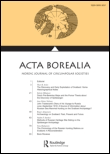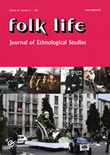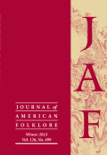
VOLKSKUNDE
Scope & Guideline
Illuminating the Complexities of Folklore
Introduction
Aims and Scopes
- Cultural Heritage Studies:
Explores the preservation, interpretation, and representation of cultural heritage, including tangible and intangible aspects, and the role they play in contemporary society. - Folklore and Ethnology:
Investigates traditional narratives, practices, and beliefs, focusing on their evolution and significance within various cultural contexts. - Interdisciplinary Approaches:
Utilizes methodologies from history, anthropology, sociology, and art history to provide comprehensive analyses of cultural phenomena. - Contemporary Issues in Heritage:
Addresses current debates in heritage management, including themes of colonialism, nationalism, and the ethical dimensions of heritage preservation. - Community Engagement and Education:
Highlights the role of local communities in heritage practices and the importance of education in fostering an appreciation for cultural diversity.
Trending and Emerging
- Digital Heritage and Technology:
An increasing number of papers focus on the intersection of technology and heritage, exploring digital archiving, virtual reality, and the impact of social media on cultural preservation. - Intangible Cultural Heritage:
There is a marked rise in interest in intangible cultural heritage, with discussions surrounding its significance, safeguarding practices, and the role of community participation in its transmission. - Ethics and Controversial Heritage:
Emerging discussions on ethical considerations surrounding heritage, particularly regarding controversial or difficult histories, showcase a trend towards critical engagement with the past. - Cultural Narratives in Crisis:
Themes around the cultural narratives that emerge during crises, such as pandemics or wars, are increasingly prominent, reflecting a societal need to understand and document these experiences. - Sustainable Heritage Practices:
There is a growing emphasis on sustainability in heritage practices, focusing on how cultural heritage can contribute to sustainable development goals and environmental awareness.
Declining or Waning
- Traditional Folklore Narratives:
There has been a noticeable decrease in papers solely focused on traditional folklore narratives, as the discourse shifts towards contemporary interpretations and applications within modern contexts. - Colonial Heritage Studies:
The focus on colonial heritage as a standalone topic has waned, likely due to an increasing emphasis on postcolonial critiques and the complexities of cultural restitution. - Historical Artifacts and Static Displays:
Research centered exclusively on historical artifacts and their static displays in museums is less frequent, with a growing preference for dynamic, participatory, and community-based approaches to heritage.
Similar Journals

e-rph-Revista electronica de Patrimonio Historico
Innovating Solutions for Heritage Conservatione-rph-Revista electronica de Patrimonio Historico is a prominent open-access journal published by UNIV GRANADA, dedicated to the study and dissemination of research focused on historical heritage and preservation. Since its inception in 2007, this journal has become an essential platform for scholars, researchers, and practitioners in the field, offering a wealth of peer-reviewed articles that contribute to the understanding of cultural heritage's significance in our society. With its ISSN 1988-7213 and a commitment to open-access dissemination, e-rph ensures that rigorous academic research is accessible to a global audience, thereby fostering knowledge exchange and collaboration among professionals and students alike. As the preservation of historical patrimony becomes increasingly vital in a rapidly changing world, this journal stands at the forefront of scholarship, inviting contributions that explore innovative solutions and perspectives on heritage conservation.

Acta Borealia
Innovating Perspectives in Anthropology and BeyondActa Borealia is a prestigious academic journal published by ROUTLEDGE JOURNALS, TAYLOR & FRANCIS LTD, based in the United Kingdom. Since its inception in 1984, the journal has established itself as a vital platform for scholarly discourse in the fields of Anthropology, Cultural Studies, History, Sociology, and Political Science. With a commendable impact factor and placement in Q1 and Q2 quartiles across various categories, it demonstrates a strong commitment to high-quality research and innovative contributions. The journal is well-ranked in Scopus metrics, highlighting its influence and reach within the arts and humanities as well as social sciences. Acta Borealia publishes original research articles, reviews, and critical essays, making it an essential resource for researchers, professionals, and students alike seeking to enhance their understanding of northern studies and related fields. While securing access may require institutional login or subscription, the journal's rich content continues to foster interdisciplinary discussions that are critical for navigating complex social issues.

Novyi Filologicheskii Vestnik-New Philological Bulletin
Innovating Approaches to Philological InquiryNovyi Filologicheskii Vestnik-New Philological Bulletin is a distinguished academic journal published by the Russian State University for the Humanities, devoted to the interdisciplinary study of linguistics, literature, and philology. With its ISSN 2072-9316, this journal serves as an essential platform for scholars, researchers, and students aiming to explore the depths of philological research and its applications. Although currently operating under a traditional access model, the journal emphasizes accessibility and engagement with advancements in linguistic theory and literary analysis, reflecting the evolving landscape of philological studies. The bulletin is dedicated to fostering academic discourse by publishing original research, critical essays, and comprehensive reviews, thereby contributing significantly to the advancement of knowledge and understanding in the field. Set in the heart of Moscow, the journal aims to bridge local and global scholarship, inviting contributions that showcase innovative methodologies and theoretical frameworks. Overall, Novyi Filologicheskii Vestnik-New Philological Bulletin stands as a vital resource for anyone interested in contemporary developments in philology and related disciplines.

Folk Life-Journal of Ethnological Studies
Advancing Knowledge in Anthropology and Cultural Studies.Welcome to the Folk Life-Journal of Ethnological Studies, a distinguished publication devoted to exploring the rich tapestry of human culture and ethnological research. Published by Routledge Journals, Taylor & Francis Ltd, this journal serves as an essential platform for scholars and practitioners within the fields of Anthropology, Arts and Humanities, and Cultural Studies. With a publication history stretching back to 1963, the journal has become a valuable resource for disseminating innovative and interdisciplinary research, contributing to a deeper understanding of diverse cultural phenomena. Despite its current quartile rankings of Q4 across multiple categories, 'Folk Life' continues to strive for academic excellence and encourages submissions that challenge existing narratives and offer fresh perspectives. Although not open access, articles published in this journal are rigorously peer-reviewed, ensuring the highest scholarly standards. Researchers, professionals, and students alike will find rigorous and thought-provoking studies within its pages, making Folk Life an important fixture in the academic landscape.

International Journal of Intangible Heritage
Advancing the Dialogue on Intangible Heritage.The International Journal of Intangible Heritage, published by the NATL FOLK MUSEUM KOREA-NFMK, stands as a premier platform dedicated to the exploration and preservation of intangible cultural heritage. With an ISSN of 1975-3586 and an E-ISSN of 1975-4019, this journal has successfully carved a niche in the fields of Conservation, Cultural Studies, and Museology, achieving Q1 categorization across these disciplines in 2023. It ranks impressively in Scopus, being #17/83 in Museology and #33/103 in Conservation, highlighting its significant contribution to the academic discourse in these fields. Published in South Korea, this journal not only serves as a vital resource for researchers and professionals but also engages students aspiring to enhance their understanding of intangible heritage. Accessible without an open access model, it features a blend of scholarly articles, reviews, and case studies from 2011 through 2024, making it a robust repository for current and emerging practices in the safeguarding of cultural expressions. By fostering innovative dialogue among scholars and practitioners globally, the International Journal of Intangible Heritage plays a crucial role in the ongoing dialogue surrounding the value and significance of intangible cultural assets.

Slovensky Narodopis-Slovak Ethnology
Illuminating the Rich Tapestry of Slovak EthnologySlovensky Narodopis-Slovak Ethnology is a leading academic journal dedicated to the exploration of ethnology and cultural studies, published by the Slovak Academy of Sciences at the Institute of Ethnology. With an Open Access policy since 2013, it strives to make high-quality research readily accessible to a global audience, enhancing the dialogue around Slovak cultural heritage and broader anthropological topics. The journal holds a notable position in the field, currently ranked Q2 in anthropology for 2023, indicating its substantial contribution to the discipline. It is indexed in Scopus, with a current rank of 245 out of 502 in the Social Sciences category, reflecting its value within the academic community. Researchers and students alike can look forward to a rich array of original research articles, reviews, and essays that not only delve into Slovak ethnology but also engage with international perspectives, thereby enriching the understanding of cultural dynamics and practices.

Folklore-Electronic Journal of Folklore
Unveiling the Myths and Traditions of SocietiesFolklore-Electronic Journal of Folklore is a pioneering academic platform dedicated to the expansive field of folklore studies, published by the esteemed Estonian Literary Museum. With an ISSN of 1406-0957 and an E-ISSN of 1406-0949, this journal has established itself as a notable contributor to the scholarship on cultural expressions and traditions, particularly in the context of Estonia and beyond. Operating under an open access model, the journal aims to disseminate high-quality research that illuminates the rich tapestry of human folklore, mythology, and cultural practices across various societies. Recognized for its impact, it has been categorized in the Q3 quartile for Anthropology and Q2 for Cultural Studies in 2023, reflecting its relevance and rigorous academic standards. By ranking #436 out of 1304 in Cultural Studies and #267 out of 502 in Anthropology according to Scopus, the journal serves as a vital resource for researchers, professionals, and students interested in the interplay between folklore and contemporary societal issues. Overall, the Folklore-Electronic Journal of Folklore not only promotes scholarly exchange but also invites contributions that push the boundaries of traditional folklore research.

FABULA
Cultivating Scholarly Excellence in Literary StudiesFABULA is a distinguished academic journal published by WALTER DE GRUYTER GMBH, focused on the fields of Cultural Studies and Literature and Literary Theory. Since its inception in 1958, FABULA has contributed significantly to the discourse surrounding narrative theory, literary analysis, and cultural criticism, positioning itself as a vital platform for innovative research. With a Q2 ranking in Literature and Literary Theory and a Q3 ranking in Cultural Studies for 2023, the journal demonstrates its commitment to high-quality scholarship while fostering interdisciplinary dialogue among researchers and professionals. Although it currently does not offer Open Access options, its rigorous selection process ensures that published works meet the highest academic standards. Located in Berlin, Germany, FABULA remains a crucial resource for scholars seeking to deepen their understanding of the complexities inherent in narrative forms and their cultural implications, supporting ongoing research endeavors from 1964 through 2024.

Vestnik Slavianskikh Kultur-Bulletin of Slavic Cultures-Scientific and Informational Journal
Bridging Past and Present in Slavic ScholarshipVestnik Slavianskikh Kultur-Bulletin of Slavic Cultures is a distinguished scientific and informational journal published by the State Academy of Slavic Culture. This journal, with ISSN 2073-9567, plays a pivotal role in the field of Slavic studies, providing a platform for the dissemination of cutting-edge research, cultural discourse, and scholarly analysis pertaining to Slavic cultures and civilizations. The journal aims to foster a deeper understanding of Slavic heritage, literature, and the societal dynamics shaping these cultures today. Although currently lacking an open access model, it remains an important resource for researchers, professionals, and students interested in the rich tapestry of Slavic traditions and contemporary cultural phenomena. With its thoughtful curation of articles, Vestnik Slavianskikh Kultur is poised to contribute significantly to ongoing scholarly conversations within the humanities.

JOURNAL OF AMERICAN FOLKLORE
Illuminating the Rich Tapestry of FolkloreJOURNAL OF AMERICAN FOLKLORE, published by the American Folklore Society, is a distinguished journal dedicated to the exploration and analysis of folklore, cultural traditions, and the diverse narratives that shape American identity. With a rich history dating back to its inception, the journal has positioned itself as a leading platform in the field, boasting a 2023 ranking of Q1 in Cultural Studies and Q2 in Arts and Humanities (miscellaneous). The journal's impact within the academic community is underscored by its high Scopus rankings, placing it in the 83rd and 65th percentiles in Cultural Studies and Arts and Humanities, respectively. Readers can access a wealth of insightful articles that contribute to ongoing discussions in folklore studies, cultural anthropology, and related disciplines. As the study of folklore becomes increasingly relevant in understanding contemporary societal dynamics, JOURNAL OF AMERICAN FOLKLORE serves as an essential resource for researchers, professionals, and students alike, enriching discourse and fostering a deeper appreciation for the cultural experiences that define America.